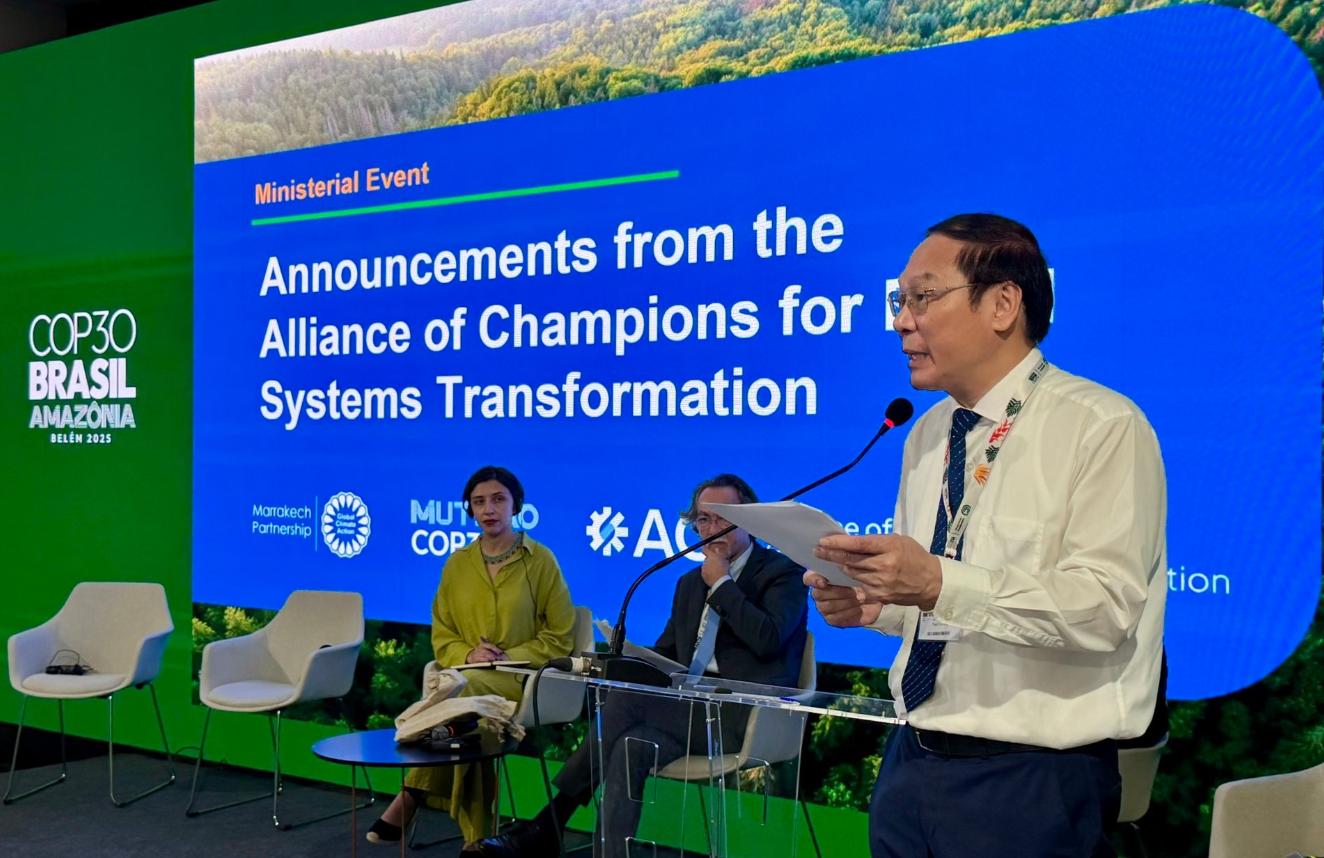Viet Nam’s entry into the ACF Alliance expands opportunities for agricultural innovation, knowledge exchange, and deeper international cooperation.
On November 18 in Belém, Brazil, on the sidelines of the 30th UN Climate Change Conference (COP30), the Ministry of Agriculture and Environment became an official member of the Alliance of Champions for Food Systems Transformation (ACF).
The ACF Alliance was founded by five countries including Brazil, Norway, Cambodia, Rwanda, and Sierra Leone—and was first announced at COP28 in Dubai in 2023. The initiative brings together countries that share a strong ambition and political commitment to transform food systems to deliver better outcomes for people, nature, and the planet.
 Deputy Minister Le Cong Thanh speaks at the Ministerial Session of the ACF Alliance. Photo: ICD.
Deputy Minister Le Cong Thanh speaks at the Ministerial Session of the ACF Alliance. Photo: ICD.Speaking at the Ministerial Session, Deputy Minister Le Cong Thanh said, “Joining the ACF Alliance will help drive innovation, mobilize technical support and financial resources for Viet Nam’s agricultural sector; while also creating opportunities for Viet Nam to share its experiences and learn from other members throughout the process of transforming our agriculture and food systems.”
The Alliance’s core principles emphasize ensuring that food-systems transformation generates positive changes across key areas such as food and nutrition security, equity and livelihoods, resilience and adaptation, emissions reduction, and the protection of natural ecosystems and biodiversity for the benefit of people and the planet.
The ACF promotes fairness and sustainability by encouraging broad stakeholder participation, while helping address the root causes of environmental degradation and social challenges through an integrated, cross-sectoral approach.
The Alliance is also committed to transparency and to collaborating with domestic and international partners to strengthen learning, knowledge sharing, and cooperation in finance and technology.
The Ministry of Agriculture and Environment serves as Viet Nam’s lead agency coordinating cross-sectoral efforts in agriculture, natural resources, environment, climate change, and food security. At COP30, alongside Viet Nam, Italy and Colombia also joined the ACF as new official members.
 A delegation of the Ministry of Agriculture and Environment at COP30. Photo: ICD.
A delegation of the Ministry of Agriculture and Environment at COP30. Photo: ICD.Viet Nam’s agricultural sector is undergoing a significant shift from a model focused primarily on “yield and volume” to one centered on “multi-value agriculture,” prioritizing efficiency, quality, nutrition, sustainability, and low-emissions development.
Joining the ACF Alliance aligns closely with Viet Nam’s national strategies and policies on agriculture, climate change, and biodiversity, particularly the National Action Plan for Sustainable Food Systems Transformation to 2030.
Membership in the Alliance is expected to enhance Viet Nam’s role and visibility in global initiatives and action programs on agriculture and food systems, contributing to a greener, more equitable, and more climate-resilient future for the global food system.
Food-systems transformation has become a central theme in global climate and development cooperation over the past decade. Since the 2021 UN Food Systems Summit, more than 150 countries have developed national pathways to make their food systems more resilient, equitable, and sustainable. These pathways respond to mounting pressures from climate change, biodiversity loss, supply-chain disruptions, and rising food-price volatility. Agriculture currently accounts for roughly one-third of global greenhouse-gas emissions and remains a major driver of land degradation and deforestation, making it a priority sector for climate action under the Paris Agreement.
The Alliance of Champions for Food Systems Transformation (ACF) was established to accelerate this global shift by connecting countries that share strong political commitment and are ready to implement large-scale reforms. The Alliance focuses on aligning national policies with climate and biodiversity goals, mobilizing finance for sustainable agriculture, and promoting innovations such as climate-smart farming, regenerative production, digital agriculture, and nature-positive approaches. ACF also collaborates with major international partners, including FAO, IFAD, UNDP, UNEP, and the UN Food Systems Coordination Hub, to support evidence-based policymaking and coordinated action across continents.
For developing and climate-vulnerable countries, food-systems transformation is essential to safeguard food security. Southeast Asia is among the regions most affected by extreme weather. According to UN assessments, climate stresses such as heatwaves, drought, saline intrusion, and unpredictable rainfall could reduce the region’s agricultural productivity by up to 15-20% by 2050. This places pressure on governments to strengthen resilience, diversify crops, reduce post-harvest losses, and adopt low-emissions supply chains.
International climate-finance mechanisms are increasingly prioritizing agriculture within their funding portfolios. Instruments such as the Green Climate Fund (GCF), Global Environment Facility (GEF), and IFAD’s ASAP+ have launched dedicated windows for food-systems transformation, creating opportunities for countries to implement large-scale mitigation and adaptation projects aligned with their national climate strategies.